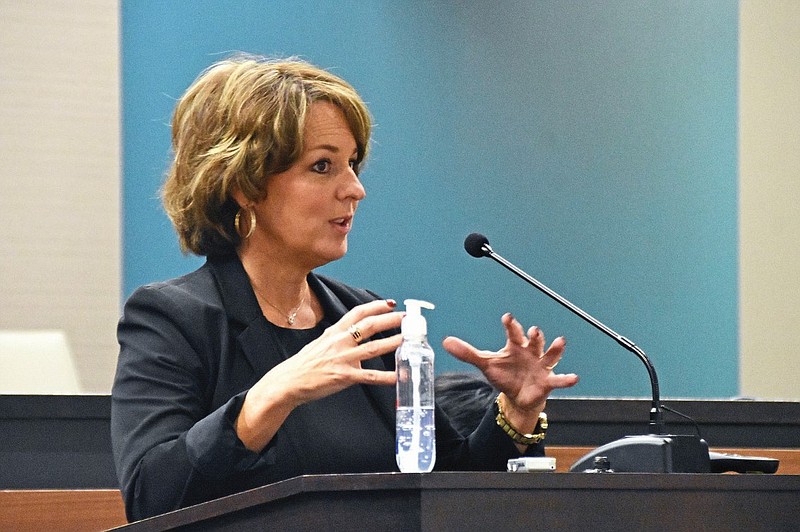The Earle School District has improved its financial operations since it was taken over by the state for fiscal distress in 2017, but the 415-student school system continues to struggle with academic achievement.
Stacy Smith, deputy commissioner in the Arkansas Division of Elementary and Secondary Education, said Thursday that the agency intends to recommend to the state Board of Education next month that it:
Release the Earle district from the state's fiscal distress classification.
Continue to classify Earle as a district in the "Level 5 - in need of intensive support" in the state's school district accountability system.
Establish a state-appointed, limited-authority school board for Earle, using four of the five members of the School Board who had been suspended when the state takeover occurred.
Direct the Earle district to employ a third-party company or vendor to provide coaching and support for classroom instruction.
"It's not a complete release" from state control, Smith told the Education Board on Thursday, in advance of what she said will be next month's recommendation and request for board action.
"We have got to get the instruction in the classroom to a much higher level," she said.
The limited authority board would undergo intensive training and their actions regarding the school district would go to Arkansas Education Secretary Jacob Oliva to be confirmed or overturned.
"There would still be some oversight and direction ... to make sure they understand their role," Smith said.
Smith said the members of the suspended school board -- Eric Cox and Charlie Cox, who are not related; April Witherspoon; and Arthur Berry -- have continued to serve the district as members of a citizens advisory board. A fifth member of the suspended board has passed away, making it necessary for the board or the state to select a new member for the limited authority board.
In response to questions from Education Board Chairman Ouida Newton, Smith said the third-party organization to support instruction in Earle would likely be different than the third-party organization -- FEF Arkansas -- that has been selected to manage the day-to-day operation of the Marvell-Elaine School District.
"The potential for that is there," Smith said about a transformation contract like the one for Marvell-Elaine, "but it's really more about direct support and having a plan for improving the instruction in a particular school. It's coming in with intensive support beyond the state just assisting."
She said the focus of the contracting organization would be on academics, while her staff would still be assisting with finances and monitoring the contractor to see that what they are saying they are doing is being done.
In 2017, the Earle district was reported to have almost $2 million in improper expenditures of state and federal funds, dating back to the 2015-16 school year. The district had expenses greater than revenues, unpaid bills to vendors, other outstanding debt, and employee contract and payroll issues.
The state Department of Education loaned the district more than $646,000 that the district is still repaying at a rate of $10,000 a month.
In more recent months and years, the district has improved its buildings, and increased to 71% its faculty members who hold state licenses. Students -- while still scoring very low on state-required exams -- are showing academic growth from year to year.
State Education Board member Jeff Wood of Little Rock questioned how long the state department has been in charge of the academics in the fiscally distressed school district.
Smith said the covid-19 pandemic hindered efforts.
"We were implementing all of the high quality instructional materials while at the same time we were going to a digital model," she said. "We are not where we need to be. I'm not saying we have done great work. We have done work. We have been there, but we are not seeing the progress we need to see. That is part of the reason that we think we need to bring in that third party to be much more intensive because what we are doing is not getting the outcomes we need to happen. We need to step aside and help with organizing and coordinating and try something else."
Wood said he agreed that there is no magic wand or silver bullet that the state can use to improve a school district. But he said there is a lot of "good news" coming out of Earle in terms of the percentage of licensed staff and academic growth among students.
He questioned why that has not translated into higher student achievement.
Smith said there have been "starts and stops" in regard to administrative personnel and turnover in key roles in the system.
She said there was resistance early on in the district to changing curriculum materials. She also said the heavy reliance during the covid-19 pandemic on technology has continued but needs to be reduced in the middle and high school grades.
